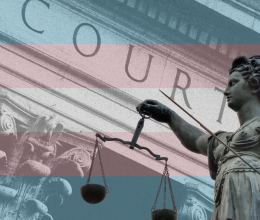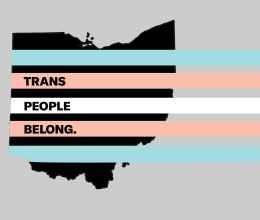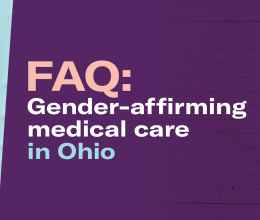COLUMBUS – Today the ACLU of Ohio filed a brief on behalf of the National Association of Social Workers, including its Ohio Chapter (NASW), as amicus curiae to the Ohio Supreme Court in the case In re LES – a lawsuit centering on Ohio’s parentage laws as they pertain to same-sex couples and the best interest of the children.
Ms. Edmonds and Ms. Shahani were involved in a romantic relationship from 2003-2015 and had three children together through artificial insemination. Ms. Shahani was the biological mother, and the two chose a sperm donor of Columbian heritage to match Ms. Edmonds heritage. The women gave each child the last name of “Edmonds-Shahani” and executed various legal documents recognizing one another as equal co-parents, including a Living Will and Health Care Power of Attorney. The relationship predated the U.S. Supreme Court’s landmark decision in Obergefell v. Hodges, which held that bans on same-sex marriage are unconstitutional
In 2015, the relationship deteriorated, and the parties entered a formal agreement to unwind it. The agreement divided the parties’ property and agreed to a parenting schedule for the children. In 2017, Ms. Edmonds filed a petition to establish her parental rights, and the Hamilton County Juvenile Court held that a same-sex partner does not fall within the definition of a “parent” under Ohio statutes because she was neither biologically related to the children nor married to the birthmother. The case was appealed to the First District Appellate Court, which reversed the lower court’s ruling, and now the Supreme Court of Ohio is reviewing the case.
“The Supreme Court of Ohio must interpret Ohio’s parentage laws to appropriately prioritize the best interests of children. Ms. Edmonds has been nurturing the three children that she helped bring into this world throughout their lives. The overwhelming body of social science research confirms that there is potentially devastating harm inflicted on a child if separated from a parental figure, and that this harm does not depend on whether there is a biological link between the two. The court should be guided by best interests of the child, regardless of whether the parents are the same or opposite sex. To rule otherwise leaves the children of same-sex couples in Ohio – who were unable to marry prior to Obergefell – in danger of unequal treatment of the law and exposes them to detrimental social and emotional consequences,” noted Amy Gilbert, Senior Staff Attorney for the ACLU of Ohio.
The ACLU of Ohio argues that Ms. Edmonds would today be a legally recognized parent of the three children had Ohio law provided a path for same-sex marriage at the time of their birth. As cited in the brief, fracturing the bond between the parent and child can have dire consequences on the child’s wellbeing.
The ACLU of Ohio urges the Supreme Court of Ohio to affirm the lower court’s decision, providing a pathway for Ms. Edmonds to be recognized as the legal parent of her children and thus entitled to the same rights as Ms. Shahani.








